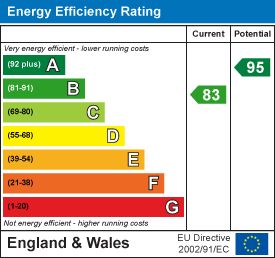Energy Performance Certificate (EPC) requirements for landlords and rented properties: what are the rules, how might they change, and how can you get prepared?
If you’re a landlord in England and Wales you might already be aware of the proposed changes to the minimum Energy Performance Certificate (EPC) rating required for rental homes.
These changes are part of the government’s target of achieving Net Zero by 2050, and result from a government consultation in December 2020. The consultation proposed that only homes with an EPC rating of A, B, or C, are to be offered for rental.
If this policy is introduced, it could apply to newly-rented properties from as early as 2025, and existing tenancies from 2028.
Find out how to check or renew your property’s Energy Performance Certificate.

What are the current EPC requirements for landlords?
Since 2018, when the Minimum Energy Efficiency Standards (MEES) rules were introduced, only those properties with an EPC rating of A to E have been legally allowed to be rented.
What does MEES stand for and how does this apply to landlords?
The Minimum Energy Efficiency Standards (MEES) are a set of rules relating to rental homes. They were first introduced in England and Wales in 2015.
In 2018, MEES made it illegal for private landlords to rent a property that had an EPC rating below E. That meant that any homes rated F or G couldn’t be offered for rent until their rating was improved.
The latest government consultation suggested that by 2025, MEES will be further strengthened to only allow only new rental homes with the highest (best) ratings of A, B or C.
What does this mean if you’re a landlord?
More than half of the rental homes listed on Rightmove have an EPC rating below a C. And in a recent Rightmove survey of more than 2,500 landlords, a third (33%) said they were unaware of this potential rule change, while 29% of landlords weren’t sure if the EPC rating of their rental property is currently below C.
The EPC requirements for landlords could be set to change, so if you’re renting out a property, it’s really important to check the current rating so you can plan improvements if you need to.
To find out more, or to check the EPC rating of your property, take a look at our guide to Energy Performance Certificates.
Do I need to renew an EPC during a tenancy in 2022?
Not if you have the same tenants in the property and you’re not making any changes to their tenancy agreement. You only need to renew an expired EPC when you plan to market the property for new tenants, when you make changes to the tenancy agreement with existing tenants, or if you want to reflect improvements you’ve made to a property that will result in an improved rating.
There is speculation that along with the proposed legislative changes to the EPC for rental homes, it will also become a legal requirement for landlords to have a valid EPC at all times, even if the same tenants remain in the property.
How often do landlords need an EPC?
An EPC lasts for 10 years, no matter how many times the property is bought, sold or let.
Can landlords be fined for not having EPC?
Yes. Local authorities have the power to issue fines of £500 if you don’t make a copy of the EPC available to your tenant, and up to £5,000 for not having a valid EPC. There are proposals to raise this fine to £30,000 by 2025.
Do I need my tenant’s permission before arranging an EPC assessment?
Yes, it’s a legal requirement to give tenants at least 24 hours written notice before an EPC assessment.
Are my tenants entitled to a copy of the EPC?
Yes, it’s a legal requirement for you to give a copy of the EPC to your tenants.
How can landlords prepare if the EPC regulations do change in 2025?
Check your rental property’s current EPC carefully. If you’ll need to make improvements, take a look at what you can do to boost the rating. This could mean installing insulation, upgrading to double- or triple-glazed windows and doors, or replacing the boiler.. You can find out how to improve a home’s EPC rating here.
If you decide to make the changes now, you should book an assessment as soon as possible after you’ve completed them, so your new EPC will reflect the improvements.
What’s the average cost of making improvements to reach an EPC rating of C?
It depends on the size of your rental property. The government estimates the average cost to landlords of making improvements to reach an EPC rating of C is around £4,700. For larger, and older homes, this cost will be significantly higher.
What will happen if I can’t afford to make the improvements to my rental homes in time?
At the moment, if you make improvements that cost up to £3,500 – and you still can’t improve your property to an E – you can register for an ‘all improvements made’ exemption.
However, under the proposed changes from 2025, landlords may need to pay up to £10,000 to get rental properties up to a C rating before being eligible for a further exemption.
Further details on these exemptions and how to apply are here.
What financial assistance is the government offering?
The government’s Spring Statement in April 2022 announced a zero-rate of VAT on certain materials used for EPC rating improvements. This includes insulation, controls for heating and hot water supply, solar panels and heat pumps.
It’s also worth checking if your local council offers any financial incentives for energy-efficient improvements.

